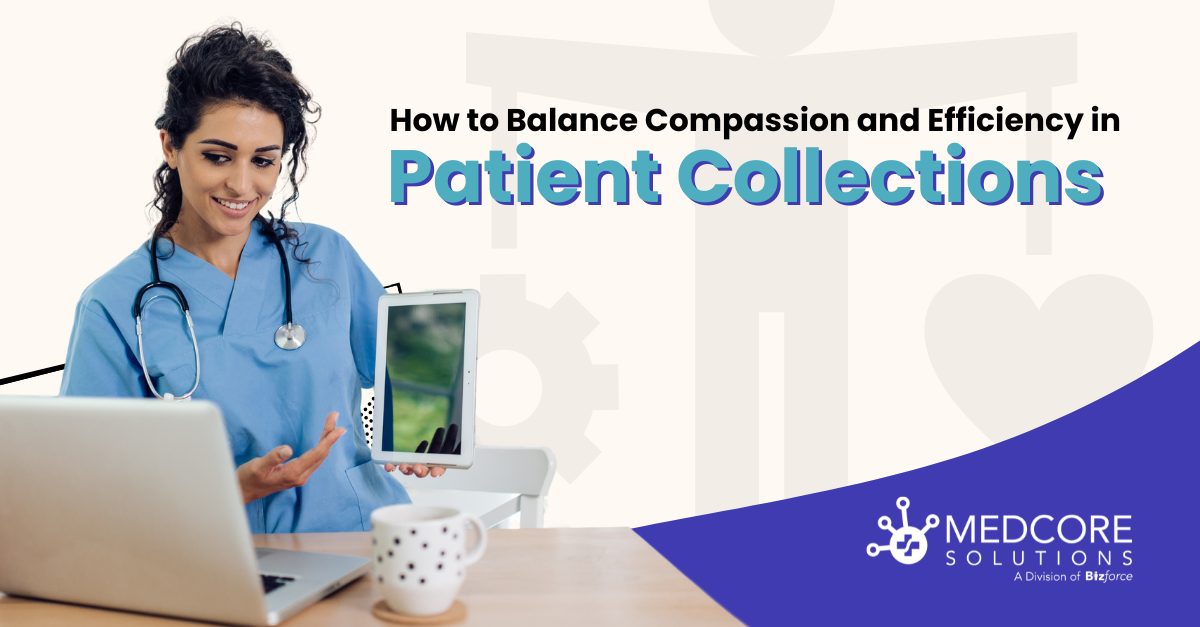Balancing compassion and collection efficiency in healthcare is a challenging yet essential task. On one hand, healthcare providers must ensure their financial stability by collecting payments for services rendered. On the other hand, they must approach this process with empathy, as one in ten adults in the U.S. have significant medical debt, according to a KFF analysis. Patients often face significant stress and financial burdens regarding their healthcare. Not having empathy will not only reduce patient satisfaction but may also deteriorate the patients’ health. This blog explores strategies for achieving this balance, focusing on the importance of empathy, clear communication, and efficient practices.
Understanding the Importance of Compassion

Compassion is a core value in healthcare, integral to the patient experience. Patients often encounter stress and anxiety related to their health conditions, which can be exacerbated by financial concerns. Approaching collections with empathy helps alleviate this stress, fostering trust and a positive relationship between patients and providers.
MedCore’s medical collections specialists exemplify this compassionate approach. They understand the delicate balance between ensuring financial stability for healthcare providers and addressing the financial burdens faced by patients. MedCore’s team is trained to handle collections with sensitivity, offering clear communication and empathetic interactions. By prioritizing understanding and support, they enhance collection efficiency while also boosting patient satisfaction and trust. This approach ensures that financial conversations do not undermine the overall patient experience, reinforcing MedCore’s commitment to compassionate care and effective financial management.
Collection Efficiency Through Empathy
Patients who trust their healthcare providers are more likely to communicate openly about their financial situations and work together to find solutions. Collections specialists should be trained to listen actively, acknowledge patient concerns, and respond with empathy. For instance, if a patient expresses difficulty in paying a bill due to unexpected medical expenses, a compassionate response might include acknowledging the hardship, expressing understanding, and discussing flexible payment options. This approach not only addresses the payment issue but also strengthens the providers’ relationship with their patients.
Clear and Transparent Communication
This is crucial when processing collections. Patients should be well-informed about their bills, including what services were provided, the costs involved, and available payment options. This transparency helps prevent misunderstandings and reduces the likelihood of disputes.
Detailed Explanations and Resources
Providing detailed explanations of charges and billing processes can demystify the collections experience for patients. Using plain language and avoiding medical jargon ensures that patients fully understand their financial obligations. Additionally, offering written summaries or online resources can be helpful for patients who need to review information at their own pace.
Strategies for Collection Efficiency

While compassion is crucial, healthcare providers also need to maintain efficiency in their collection processes to ensure financial stability. Efficient collections improve cash flow and reduce administrative burdens and operational costs.
Leveraging Technology
Technology can significantly enhance the efficiency of medical collections. Automated billing systems, electronic health records (EHRs), and patient portals streamline the billing process and provide patients with easy access to their accounts. These technologies enable timely and accurate billing, reducing delays and errors.
For instance, automated reminders for upcoming payments or overdue bills can prompt patients to take action without the need for manual follow-up by staff. Online payment options, including credit card payments and electronic fund transfers, provide convenience for patients and accelerate the collection process.
Training and Development
Investing in the training and development of collections specialists is essential for balancing compassion and efficiency. Staff should be knowledgeable about billing procedures, insurance policies, and patient communication techniques. Continuous training keeps them informed about industry best practices and regulatory requirements.
Role-playing exercises and workshops can help collections specialists practice empathetic communication and conflict resolution. By simulating real-life scenarios, staff can develop the skills needed to handle difficult conversations with patients while maintaining professionalism and empathy.
Integrating Compassion and Collection Efficiency

The key to successful medical collections lies in integrating compassion and efficiency seamlessly.
Personalized Communication
Personalized communication can make a significant difference in the collection process. Instead of generic reminders, personalized messages that address the patient by name and reference specific details of their account can foster a more human connection. For instance, a message could read, “Dear John, we recognize that unexpected medical expenses can be difficult. We’re here to help you find a solution that fits your needs.” Personalized communication demonstrates that the provider values the patient as an individual and is committed to working together to resolve financial issues.
Flexible Payment Plans
Offering flexible payment plans is a compassionate approach that can also improve collection efficiency. Patients who might struggle to pay a large bill in one lump sum are more likely to make smaller, manageable payments over time. Flexible payment plans demonstrate that the provider is willing to accommodate the patient’s financial situation, reducing the likelihood of default.
Providers can work with patients to develop customized payment plans that fit their budgets. This might include setting up monthly installments or offering discounts for early payment. By providing options, providers can help patients feel more in control and reduce the stress associated with medical bills.
Proactive Patient Engagement
Proactive patient engagement can prevent many collection issues before they arise. This involves reaching out to patients early in the billing process to discuss their financial responsibilities and any potential challenges they might face. By addressing concerns upfront, providers can establish clear expectations and avoid misunderstandings.
For example, during the initial consultation or appointment, staff can explain the billing process, provide an estimate of costs, and discuss available payment options. This proactive approach ensures that patients are informed and prepared, reducing the likelihood of surprise bills and payment delays.
Utilizing Data Analytics
Data analytics can play a crucial role in optimizing the collections process. By analyzing patient data, providers can identify patterns and trends that inform their communication strategies. For example, data might reveal that certain patients are more likely to respond to phone calls rather than emails, or that specific times of the month are more effective for payment reminders.
Using data-driven insights, providers can tailor their communication methods to maximize efficiency and improve patient response rates. Analytics can also help identify patients who may need additional support, allowing providers to offer targeted assistance and prevent financial issues from escalating.
Conclusion
Balancing compassion and collection efficiency is essential for healthcare providers to maintain positive patient relationships and ensure financial stability. By approaching collections with empathy, transparency, and personalized communication, providers can build trust and foster a collaborative atmosphere. At the same time, leveraging technology, offering flexible payment plans, and utilizing data analytics can enhance efficiency and streamline the collections process.
Incorporating these strategies allows healthcare providers to address the financial challenges of medical billing while maintaining a compassionate and patient-centered approach. Ultimately, this balance benefits both patients and providers, creating a more supportive and effective healthcare system. By focusing on both compassion and efficiency, healthcare providers can ensure that their collection processes are not only effective but also respectful and considerate of patients’ needs.
Contact us now to learn more about how we can support your financial stability while prioritizing patient care. Click here.

